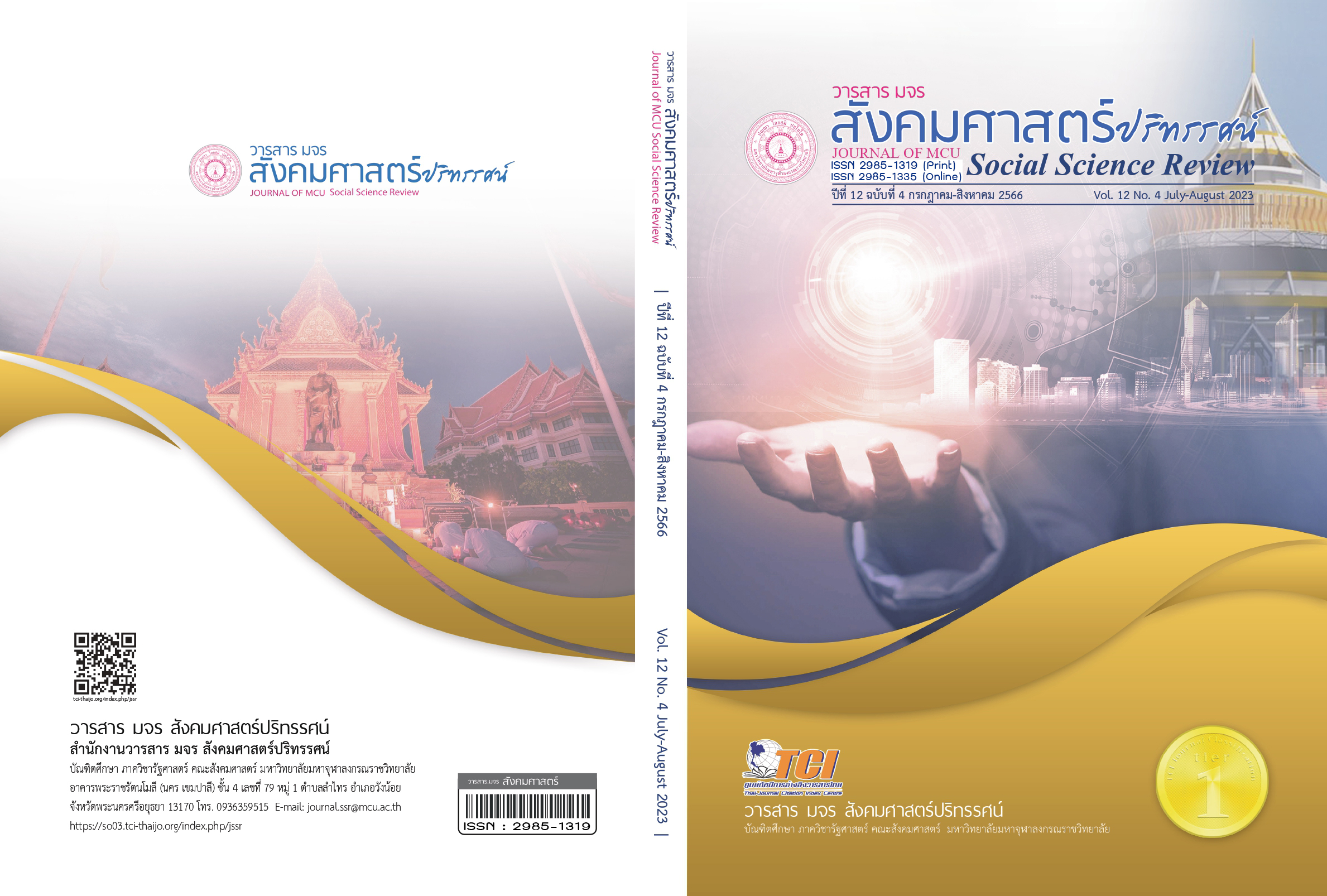แนวทางการใช้ O.R.E.O. ในการจัดการเรียนรู้ออนไลน์
คำสำคัญ:
แนวทางการใช้ O.R.E.O, การจัดการเรียนรู้, ระบบออนไลน์บทคัดย่อ
ในสถานการณ์การแพร่ระบาดของโรคติดเชื้อไวรัสโคโรน่า 2019 ต้องมีการปรับกระบวนการจัดการเรียนรู้ระยะไกล เพื่อให้การเรียนรู้ของนักเรียนไม่หยุดนิ่ง ครูจำเป็นต้องมีการพัฒนาความรู้ในเทคโนโลยีควบคู่กับความรู้ในการสอนอย่างเร่งด่วน โดยมีผู้บริหารเป็นผู้นำทางวิชาการวางเป้าหมายการเรียนรู้ออนไลน์ให้แก่โรงเรียนและสนับสนุนให้คำปรึกษาแก่ครูอย่างใกล้ชิด รวมไปถึงผู้ปกครองก็ต้องมีความรับผิดชอบร่วมกันในการเรียนออนไลน์ด้วย O.R.E.O. เป็นแนวทางการเรียนรู้ออนไลน์ที่แจกแจงบทบาทภาระหน้าที่ของผู้บริหาร ครู นักเรียนและผู้ปกครองให้เกิดประสิทธิภาพ ประกอบด้วย 4 องค์ประกอบคือ วัตถุประสงค์ ความรับผิดชอบ ความคาดหวัง และการจัดระเบียบ บทความฉบับนี้จึงมีวัตถุประสงค์เพื่อนำเสนอแนวทางการใช้ O.R.E.O. ในการจัดการเรียนรู้ออนไลน์สำหรับโรงเรียน โดยมุ่งเน้นที่ภาวะผู้นำด้านดิจิทัล ความรู้จำเพาะเนื้อหาโดยใช้เทคโนโลยี คุณลักษณะและนิสัยของนักเรียนออนไลน์ที่ประสบความสำเร็จ และการสนับสนุนของผู้ปกครอง โดยตระหนักว่าเทคโนโลยีไม่ใช่ทั้งหมดของการเรียนรู้ แต่ก็เป็นสิ่งที่สำคัญที่ขาดไม่ได้นั่นเอง
เอกสารอ้างอิง
ธิติ ธีระเธียร. (2564). การจัดการศึกษาแบบ Remote Learning เพื่อการสอนแบบ Teach From Home. สืบค้น 30 ธันวาคม 2564, จาก https://www.starfishlabz.com /blog/107-การจัดการศึกษา-remote-learning-เพื่อการสอนแบบ-teach-from-home
พรทิพย์ ศิริภัทราชัย. (2556). STEM Education กับการพัฒนาทักษะในศตวรรษที่ 21. วารสารนักบริหาร, 33(2), 49-56.
สุทธิดา จำรัส. (2560). การเรียนรู้ที่บูรณาการกับเทคโนโลยี Technology Integrated Learning. กรุงเทพฯ: จรัสสนิทวงศ์การพิมพ์.
อนุชัย ธีระเรืองไชยศรี. (2561). ข้อกำหนดการพัฒนารายวิชาเพื่อการเรียนการสอนในระบบเปิด (Thai MOOC) ระยะที่ 2. กรุงเทพฯ: สำนักงานคณะกรรมการอุดมศึกษา.
Accredited Schools Online. (2021). 10 Traits & Habits of Successful Online Students. Retrieved February 2, 2022, from www.accreditedschoolsonline org/resources/successful-online
Borup, J., Stevens, M. A., & Waters, L. H. (2015). Parent and Student Perceptions of Parent Engagement at a Cyber Charter High School. Online Learning, 19(5), 69-91.
Gopi, K. (2021). Here are the top technology trends that will impact education in 2021. Retrieved December 29, 2021, from https://gulfbusiness.com/here-are-the-top-technology-trends-that-will-impact-education-in-2021
Mishra, P. & Koehler, M.J. (2006). Technology pedagogical content knowledge: A framework for integrating technology in teacher knowledge. Teacher College Record, 108(6), 1017-1054.
Nishan, F. and Mohamed, A. (2021). Emerging stronger: policy directions for COVID-19 and beyond for public schools in the Maldives. Retrieved December 4, 2021, from https://www.emerald. com/insight/2635 -0173.htm
Sheninger, E. (2019). Digital leadership: Changing paradigms for changing times. Corwin Press.
Yang, A. (2020). Online Teaching- Do This, Not That. Retrieved November 22, 2021, from https://alisonyang.com/online-teaching-do-this-not-that
______. (2020). OREO Online Learning Guidelines. Retrieved November 22, 2021, from https://alisonyang.com/oreo-online-learning-guidelines
ดาวน์โหลด
เผยแพร่แล้ว
รูปแบบการอ้างอิง
ฉบับ
ประเภทบทความ
สัญญาอนุญาต
ลิขสิทธิ์ (c) 2023 วารสาร มจร สังคมศาสตร์ปริทรรศน์

อนุญาตภายใต้เงื่อนไข Creative Commons Attribution-NonCommercial-NoDerivatives 4.0 International License.
เพื่อให้เป็นไปตามกฎหมายลิขสิทธิ์ ผู้นิพนธ์ทุกท่านต้องลงลายมือชื่อในแบบฟอร์มใบมอบลิขสิทธิ์บทความให้แก่วารสารฯ พร้อมกับบทความต้นฉบับที่ได้แก้ไขครั้งสุดท้าย นอกจากนี้ ผู้นิพนธ์ทุกท่านต้องยืนยันว่าบทความต้นฉบับที่ส่งมาตีพิมพ์นั้น ได้ส่งมาตีพิมพ์เฉพาะในวารสาร มจร สังคมศาสตร์ปริทรรศน์ เพียงแห่งเดียวเท่านั้น หากมีการใช้ภาพหรือตารางหรือเนื้อหาอื่นๆ ของผู้นิพนธ์อื่นที่ปรากฏในสิ่งตีพิมพ์อื่นมาแล้ว ผู้นิพนธ์ต้องขออนุญาตเจ้าของลิขสิทธิ์ก่อน พร้อมทั้งแสดงหนังสือที่ได้รับการยินยอมต่อบรรณาธิการ ก่อนที่บทความจะได้รับการตีพิมพ์ หากไม่เป็นไปตามข้อกำหนดเบื้องต้น ทางวารสารจะถอดบทความของท่านออกโดยไม่มีข้อยกเว้นใดๆ ทั้งสิ้น





